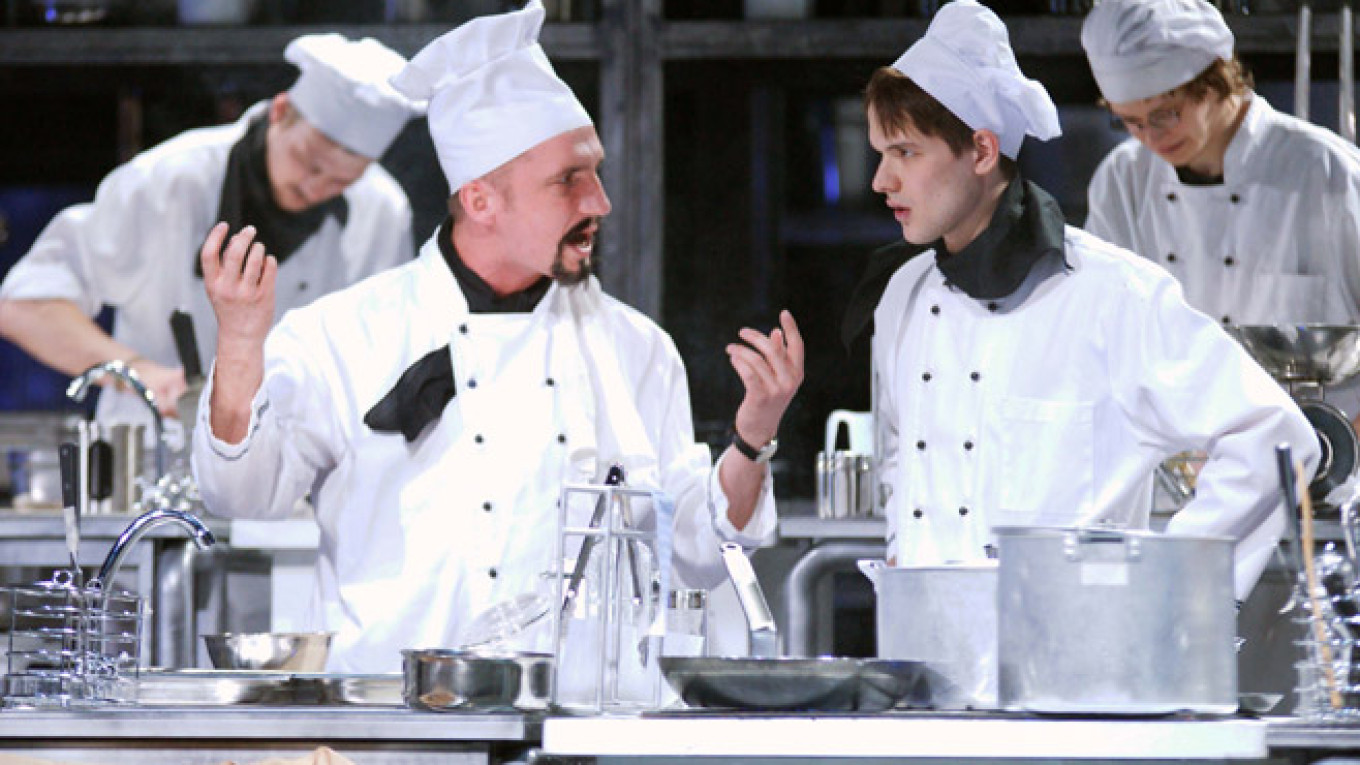Arnold Wesker’s “The Kitchen,” written in 1957, is something of a poetic cry of the soul. It fairly seems to scream, “Why can’t people get along?!” And that is precisely the message that Konstantin Raikin hammers on at length in his sparkling, swift-moving production of the play at the Satirikon Theater.
I say “The Kitchen” is poetic because of its episodic form. In the sense that a poem doesn’t tell a story, but suggests many. Or that a poem is highly selective about what it includes in its narrative.
The dialogues and plot lines of the huge cast — I count 29 players in the Satirikon’s program — are distilled and reach us only in tight, enigmatic bursts of scenes.
The visual aspect is imposing. Designer Dmitry Razumov built a detailed replica of a huge restaurant kitchen from side to side and top to bottom of the wide-open Satirikon stage. It glitters and shines with glassy surfaces, polished metal, silvery utensils and the crisp white uniforms that costume designer Maria Danilova put on almost everyone passing through the kitchen.
Wesker wrote his play about latent animosities in postwar Europe. Raikin, as he has done often in the past, used the play to comment on the realities of the post-Soviet world. Without ever drawing attention to it purposefully, he peoples this working space not only with Germans and Italians and British, but adds in a few people from Central Asia and the Caucasus.
The fragmentary nature of “The Kitchen” is what allows it to cover such large territory in such a short time. But it has its drawbacks, for there is also a sense that this story is over virtually as soon as it is just getting started. I left the theater primed for much and wanting to go further, yet having no place to go but home.
A few tales stand out among the dozens of tiny stories that are told. Primary among them is that of the German immigrant Peter, played by Anton Yegorov.
Peter is either despised or, at least, underappreciated or misunderstood by almost everyone. It doesn’t help that he is mouthy and aggressive and that he does not always treat his girlfriend Monica (Yevgenia Abramova) with all due respect.
And since he is always prepared to take on a fight, many are undertaken, either in wars of words or in fisticuffs. Peter loses all semblance of self-control when one of the waitresses blurts out that he is a fascist.
But it is also Peter who encourages everyone in the kitchen to claim their dreams, prompting the Russian to declare that he would like to live a secluded life tinkering with electronics, the Irishman to admit he would like to sleep, and the cook named Hans to burst out singing the old chestnut “Singing in the Rain,” which gets the entire kitchen crew and waitress team up and dancing.
Gazing out over the controlled chaos of kitchen life are the head chef (Vladimir Bolshov) and Mister Marengo (Alexei Yakubov), the owner of the establishment.
The head chef is one of those individuals who is interested in order for order’s sake. In fact, he doesn’t really care about order, he just doesn’t want headaches.
He is happy to turn a blind eye to conflicts when necessary, or to have subordinates who know better than to come to him with problems.
Mister Marengo, on the other hand, is an enigmatic figure whose bark is surely worse than his bite. If at first he appears to be cold and indifferent to the individual needs of his employees, he slowly emerges as the one among them all who is capable of seeing that each person has his or her own legitimate viewpoint.
Utterly fed up at the mayhem that ensues after Peter goes on his biggest rampage, the owner howls at his crew almost like a wolf at the moon. “I pay you good money,” he wails. “You eat! You work! What — else — do — you — need?!”
Yakubov unleashes that final phrase with all the pain, confusion and exasperation he can muster. His question and the pathos of its delivery surely continue to ring in the head of all 800 spectators as they file out of the theater.
“The Kitchen” plays Friday at 7 p.m. at the Satirikon Theater, located at 8 Sheremetyevskaya Ulitsa. Metro Marina Roshcha. 495-689-7844. satirikon.ru. Running time: 1 hour, 45 minutes.
Contact the author at jfreed16@gmail.com


